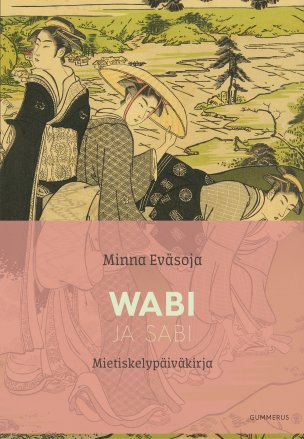A beautiful notebook for capturing thoughts and images, with Japanese insight to hidden splendor, serenity and the beauty of imperfection.
Author: Minna Eväsoja
Finnish original: Wabi ja sabi. Mietiskelypäiväkirja
Publisher: Gummerus, 2019
Number of pages: 168 pp.
Reading material: Finnish original, English sample
Rights sold: Latin America (Spanish), Intermedio
Keeping a journal is an age-old tradition in Japan. Noting the stream of daily activities and jotting down occasional thoughts has been a pastime as long as humans have maintained a written history.
In Japan, these kinds of journals are referred to as nikki and the Wabi and Sabi meditation journal seeks to honour this tradition. Handy to carry with you everywhere, Wabi and Sabi is a beautiful notebook for capturing thoughts and images. Over time, the diary becomes the joint work of the reader and writer.
The Wabi and Sabi meditation journal contains several poems about the suffering, loneliness and longing associated with love. Japanese poetry traditionally describes these emotions with wabi and sabi concepts that represent melancholy and serenity, the brilliance hidden in our hearts and minds, and white sorrow.
Eväsoja’s selected poems about wabi and sabi join her explanations in dialogue with the magnificent woodcuts that illustrate the journal.
“Wabi and sabi have many similarities, but they are not synonymous. They are never used together in Japanese literature, poetry or aesthetic concepts, although one often sees them mentioned in tandem in western references. Wabi and sabi are nevertheless linked by an undertone of mournfulness and melancholy. A feeling of loneliness and the need to withdraw from society are seen as positive things to strive for.
Wabi and sabi can also both be used to describe something that is old and seasoned. In this sense, sabi calls attention to an object’s signs of age and wear, or patina, while wabi signifies the beauty of an object’s imperfections like a crack, distortion or design limitation.
Both concepts describe the state of the heart and mind: Wabi speaks of a humble and penitent heart and an appreciation of life as it is. When it comes to wabi, feelings associated with need, want or the limitations of our abilities do not arouse a feeling of inadequacy. Sabi on the other hand indicates a mind and soul full of serenity. Feelings of inadequacy, want and need have no place in sabi, as there is always an appreciation for elegance and good taste. For sabi, patina adds a luxurious touch.”
Also available:
Shoshin: The Mind of a Novice (2018)
Almost Geisha (2017)
About the author:
Minna Eväsoja
